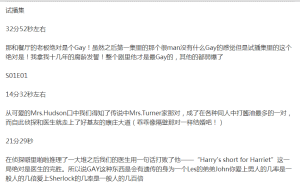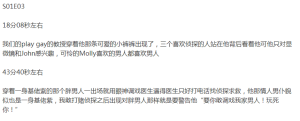Iris:Chinese Queer Fandom on BBC Sherlock
This article tries to explore the queer online community in contemporary China. To be exact, I will focus on the queer fandom in 221D forum, an online forum devoted to the pairing of the male characters in the British Broadcasting Corporation (BBC) produced mainstream television drama Sherlock, which reimaginates Sir Arthur Conan Doyle’s classic detective novel Sherlock Holmes. Since the airing of Sherlock in 2010, the queering of the male characters among Chinese netizens thrived. The actors and producers even have to clarify publicly the “non-homosexual relationship” between Sherlock and Doctor Watson. However popular and subversive paring up male characters may seems, the queer fandom does not pose a subversive force in changing Chinese heteronormative ideologies in gender and sexuality. Though an ethnographic account, this article demonstrates the discussion on homosexual sexualities and sexual politics online remains largely abstract and fantasized, without bringing any significant effect on related issues in Chinese society.
Sherlock and its Queer Fandom
BBC-produced television drama Sherlock reworksSir Arthur Conan Doyle’s famous classic novels Sherlock Holmes. The characters largely remain the same as the classic with Benedict Cumberbatch as Sherlock Holmes and Martin Freeman as Dr. John Watson investigating crimes in 21st century London. Created by Steven Moffat and Mark Gatiss(who also stars as Sherlock’s brother, Mycroft), the show receives popularity around the globe since 2010. Three seasons have been aired across four years and the fourth season is expecting to return at 2016. The show may have stopped for now but fans ‘passion on the series do not seems to be stoppable-especially in China. According to the viewing statistics of Youku, a Chinese video hosting website which has acquired BBC’s agreement in providing season 3 official Sherlock episodes and Chinese subtitles, the view counts of three seasons has already exceeded 100 million with an average rating 9.3 out of 10.[1] Yet Sherlock’s success does not confined only to the mainstream audience, the Chinese queer fandom start writing slash[2] and producing fanart pairing up the male characters in the show, most notably between Sherlock and Watson. The situation has gone viral to the point that the producers and actors has publicly responded in interviews with different media clarifying the relationship between Sherlock and Watson is purely friendship.[3] The trend has also attracted attention from international media, reporting the flourishing trend of pairing up Sherlock and Watson in the Chinese fandom.[4] It is in queer fandoms we can witness a true manifestation of “death of the author”. The production of certain meanings of a cultural text does not necessarily mean the same meaning perceived by the audience. Or in Lawrence Grossberg’s (1992) words, “ …the relationship between the audience and popular text is an active and productive one…People are constantly struggling, not merely to figure out what a text means, but to make it mean something that connects to their own lives, experiences, needs and desires…depending on how it is interpreted.” In this case, it is queer fans who actively create their own meanings in Sherlock, turning it from a detective TV series into homoerotic romances. Like what Alexander Doty has suggested (1993,1995,2000), the audience is free in reading against the grain regardless of their own sexual identities. There is always something queer in a text that we can engage non-straight reading. It is what the Chinese queer fandom doing at the moment.
Internet and the online Queer Community
Actively creating their own understanding and reading in the series, some queer fans of Sherlock even set up online forums devoted to pair up male characters in expressing their fantasies and affections. The queer fandom is easier to form in internet without spatial restriction. Moreover, in China, as a patriarchal country, women’s sexual interested are often suppressed by mainstream media. To express and exchange their erotic fantasies, it is common for women to use internet as main source of communication. Besides, the anonymity of internet identities provides platform for these women to express their “deviant” desire with protection of their privacies.[5] More importantly, the internet faces less threat of censorship by the government. The netizens could avoid being ”river crab”( Chinese slang, which stands for being ‘harmonized’ or being censored) in deploying less sensitive words or abbreviations to replace erotic or even pornographic words used in discussion or the writing of slash. In this relatively secured virtual space, 221D is formed. 221D is one of the members-only queer online communities devoted to pair Sherlock/Watson (the name in front indicates his active role in paring; the second name means the character occupies a passive role in the relationship) and Mycroft/Lestrade in Sherlock and the film Sherlock Holmes (2009,2011). This online community provides a platform to share Chinese and translated slash, fan art and fan-made video produced among members and also outside the 221D community. According to the following threads: “I am curious would our members come from all over China?”(Hen haoqi tan li de meizimen hui bu hui bianbu zhongguo ditu) “, “Are there any male members in the forum” (Turan xiang wen yixia you duoshao hanzi……) and “May I ask your age and what area do you lived in?” (Keyi diaocha yixia dajia de nianling he dìyu mie), members are predominately 18 to 22 year-old femalefrom major cities in China. Enthusiastic discussions in plots, fantasies and news related to Sherlock and the stars are very common in the community.
Queerly creative : the interpretation and creation of Sherlock in the community
The community’s common narrative is centered on Sherlock: the mutual fantasy theme that forms the virtual community. The symbolic convergence theory is used to explain shared theme and meanings of a group- which is the users of 221D in this case. This theory states that “stories and meanings that reflect how things are believed to be can be created through symbolic interactions within small groups and they can guide the members’ view of reality. These stories can…generate larger dramas …which researchers call rhetorical visions.”[6] In simple terms, it tries to explain the cohesiveness of the community and their way of interpreting the world. For the rhetorical visions, it is “a unified set of shared fantasy themes that have been swirled together to provide a coherent interpretation of reality. (my emphasis)”[7] The shared fantasy theme in the community gives users an image of ‘reality’, which members would try to interpret and make sense of this shared experience. As members in 221D interpret their own knowledge and realities are constructed around “queering Sherlock”, it becomes a common fantasy theme in the forum and renders members identification in the forum. Members hence constantly reread the episodes in Sherlock to find hints in homoerotic relationship among male characters, trying to interpret their experience and construct this ’queer reality’. In threads like “Counting out Gay men in BBC Sherlock”(Pandian yixia shen xia li de ji laomen) started by xks6 and “Official’s Fantasy on Paring is Better Than Slash”(Tongren zai fu ye bi bu shang guanfang zi Y)posted by eunrue, the members both display their construction of queer reality and experience by reading plots and scenes as manifestations of the homosexual romance between characters. Especially In “Counting out” , the thread starter even pinpoints minor male characters as homosexuals and marks down the exact moment when the character appears. (figure 1.1 and 1.2)For example, S/he claims that in episode three of season one, around 43minuntes and 40 seconds, a fat man in “gay-like purple” flirted with Dr. Watson with his eyes and made Watson call Sherlock for help. The slash and fanart also drew from different reinterpretations of the drama to form a cohesive construction of queer reality. In “I have a good friend”(wo you yi ge hao peng you), a slash written by one of the members Tobejoker, the writer interprets the unaccompanied Sherlock has an uneasy feeling towards Watson going to the bar alone. Sherlock is over-possessive towards Watson and claims that Watson is his favorite toy by asserting that he will let no one “take John away from him”.
Frequent citation of certain jargons in slash and in the drama series are found in facilitating communication and consolidating identifications. In 221D, members mainly use jargons in Western slash in addition to Japanese Boy’s Love (BL). In 221D, members write and discuss different sub-genre of slash, for instance, AU( alternate universe),NC-17 (no one 17 and under admitted), ABO(Alpha,Beta,Omega. Generally speaking, under this setting, male will occupy different rank in a hierarchy according to his biological state) and discuss the pairings on who is seme (Japanese, stands for dominate role) and uke(Japanese which means passive role). Some members would also start threads in explaining jargons often used in slash-“Alphas, Betas, Omegas: A Primer”(Alphas, Betas, Omegas: Yiduan lishi) and “Introducing special terms in slash”(Yingwen danmei xiaoshuo de zhuan you mingci jieshao)- to help newcomers to join the discussion of the share fantasy. It further creates a unified, standard and shared repertoire which allows members to contribute to the theme regardless where they come from. In a glance, it seems that it is a subversive practice in homoeroticising the characters with an inclusive manner that help every member fit in the community. However, the community is in fact by no means subversive in relating their interest in homosexual to the political sense, and their exclusiveness and constant practice of othering further confined them to be a restricted group who only interested in fantasizing their desire.
Fantasy is Fantasy
The discussion going on in the community is largely based on pure fantasy without any political rhetoric. It may be due to members’ constant awareness in putting clear boundaries between queering Sherlock and their real life. In the slash section, there are pages of slash written with pure imaginative elements: ABO, male pregnancy, alternative universe and so forth. All these elements are stated in the title of the thread for viewers to choose (or to avoid). These slash sometimes resemble the drama or the book itself, but more of them are filled with imaginative plots. This characteristic is also clearly visible in their discussion. In a thread called “I saw an interesting title in the library”(Huashuo an zai tushu guan kan dao hen youyisi de shuming), the members showed their extreme creative imagination on a random book that could be literally translated as “ Detective’s Patience”.(Figure 2)The thread starter said s/he has started fantasizing immediately when s/he saw the title. The replies also centers on similar imagination, some members imagine that detective’s “patience” (implying Lestrade) are “nurtured” by the Holmes brothers, while some replied that there should also be titles like “Doctor’s Patience”. Their creativity and imagination are so vivid that members start discussing their pity for Lestrade for having to deal with the Holmes. It, again, evidenced that the rhetorical visions guide members view the world around “queering Sherlock”. A random book in library could already spark off their imagination.
Basically, the discussion is mainly, if not all, about sharing fantasies and information. Members would ask for slash and fanart recommendation, sharing information on other related drama series, fantasizing the relation among characters or even between the characters and the members themselves. (Figure 3)One of the very few discussions on real life homosexual issues could be spot in “What is homosexuality? It’s what they say in German Children’s book. That’s so heartwarming.” (Tongxinglian shi shenme? Deguo de ertong tushu shi zheyang jiang de, chao wenxin) The thread starter posts a comic that depicts the daily life of two male homosexuals from their child’s viewpoint. Most of the members respond by stating love has nothing to do with gender yet stop at providing any deeper thoughts on similar issues in contemporary society. Only one member tries to trace the history of homosexuality in China and Europe. The thread attracts 60 responds, which is not a very active discussion considering other threads related to queer fantasy and slash could draw hundreds of replies.
The detachment between queer fantasies and real life is voiced in my email interviews with three female members. Three members unanimously said that engaging pairing in Sherlock does not increase their awareness in male homosexuals in the society. All three of them stated that they regard pairing and caring about real life homosexuals are two different matters. They also emphasize the entertainment nature of fantasizing homoerotic couples. All three of them again told me that queering is simply a hobby. Member 2 and 3 told me the reason behind their mentality: Heterosexual interactions are sometimes boring. From the interview, it is safe to suggest that the pure entertainment nature of queering is one of the main reasons that they regard “queering and caring” are separated issues, thus issues of real life homosexuals are not be their main concerns. Their answers echoes with the observation in the community and manifests Richard Berger’s (2010) comment on online queer fan forums “often [enact] their transgression and subversion through play, rather than necessarily direct politics”. In a nutshell, even if there are subversion for playing and entertaining in a transgression manner, the effect is limited.
Exclusiveness and Othering
The potential subversion of not conforming heteronormative society in slash and queer discussion is even further hindered by their exclusiveness in 221D. The community first excludes anyone from the mainstream by specifying their “deviant” nature of the forum and pointing out “female content” (implies male pairing) could be found in 221D. The community is therefore aware of their marginality and “problematic” nature; they fully understand that homoerotic fantasies may not always be acceptable to the mainstream. Hence the regulation: “Please leave this forum immediately if you have no idea what female content is… If you insist to enter the forum, we will not be responsible for any unpleasantness caused”. The fact that the forum administrator have been sending members messages in order to remind all thread starters to be more cautious in using their words and delete all sensitive contents due to another wave of internet censorship in mainland China, is another evidence that the community know clearly their forum could sometimes be regarded as “inappropriate” to government and the majority. The virtual community engages in the second level of exclusion by othering alternative Sherlock queer fandoms. A detailed and strict regulation on pairing blocks most of the other pairings from entering 221D. Generally speaking, only pairing between Sherlock and Watson, Mycroft and Lestrade are allowed. However, Sherlock has to be the top ( being dominant in the relationship) while incestual love between the Holmes brothers are not allowed. Any member who violates the pairing regulations will be banned from posting for one to three months. Forum ID will even be deleted for severe violation. Setting strict regulation in pairing ensures only members who share similar thought could remain in the community, hence showing a high level of exclusiveness in 221D. The administrator, Mrs. Hudson, whom adopted the name of Sherlock Holmes’s landlady in the stories, exhibits high level of hostility in the email interview. The interview aims to find out more on the execution and administration of the forum, administrator’s own interest in queering Sherlock and his/her attitude towards the increasing visibility of fujoshi(literally translated as ‘rotten girls’, which stands for female who are fond of male homoeroticism), yet Mrs. Hudson never directly answer the questions without sarcastically asserting that “ You always ask about homoerotic fantasy, we are talking about research paper here, not guessing where did the[Malaysian] plane crash” and “You have picked the wrong research topic”. The hostility in the administrator towards outsider could be a manifestation of elitism. According to an interview between Henry Jenkins and Xiqing Zheng (2013), Zheng regards Chinese contemporary fan culture was exceptionally elitist, especially in male homoerotic culture. It is due to people who are able to access online fandom at the end of the 20th century in China are usually restricted to young, educated and urban people, whom are quite rare in the 1990s of China. Zheng also points out that the self-constructed lineage of fandom slash writing to elite and avant-garde literature also constitutes a good position of self-defending and self-discipline. Forum members also exhibit similar exclusiveness concerning their identities. When being asked what do they feel about fujoshi’s increasing visibility due to their activity in the Sherlock fandom, all three members show their unwillingness of being identified. Member 1 and 2 express their awareness of the marginality and antagonism of fujoshi community in the eye of the majority:
Member 1 “I think it is strange. There are always something belongs to the minority, which can’t be discussed openly. Recently several doujinshi[8] writers and fujoshi were arrested, and I think the two things are related. Not everyone could distinguish fantasy and reality after all. If the whole fujoshi community is eliminated, it is the hardest blow to the community. I don’t think any of us would want this to happen.”
Member 2 “I don’t like that. Majority often harbor negative feeling towards fujoshi. Most people only see high-profile brainless young fujoshi. I don’t want to be represented by these girls. The mainstream may mistake me as one of them , or may think that people who read BL are all brainless.”
(My emphasis)
Both of them display a sense of inferiority by pointing out the importance of keeping low profile and the consequence of being known as fujoshi. They express a feeling of being subordinated to the mainstream by relating themselves as people “cannot be discussed openly” and a group who face opposition from the society. Member 2 even referred other high-profile fujoshi as “bainless” females, suggesting her strong objection for being identified. In a nutshell, interviewees are inclined to display subordination and inferiority on the community and the identities. The self-acknowledged “problematic” nature, members’ unwillingness of being identified and the elitist position combine to form a contradicted image of 221D. On one hand, the community realizes its marginal position in the society, yet on the other hand upholds an elitist image, which makes some of them reluctant to be interviewed. The mixed sense of superiority and inferiority contribute to the exclusiveness of the community, creating an obstacle in bring queer subversion to real life politics.
Conclusion
Although the BBC Sherlock queer fandom successfully attracts attention from the mainstream media, subversive queer content do not necessarily be able to reach to the surface and contribute to homosexual issues. In 221D, discussion and writing of potentially subversive homoerotic texts are confined to fantasy only. There is no observation on realistic political rhetoric addressing homosexual issues in Chinese society. This schizophrenic attitude may be caused by members’ clear line drawn on fantasy and reality. The obstacle of bringing effects to real life is further hindered by the exclusive nature of the community, in which the administrator and members, due to a mixed sense of superiority and inferiority, both display unwillingness to be connected with the society on the issue of homosexuality/homoeroticism.
[1] Calculation based on youku viewing statistic at http://www.youku.com/show_page/id_z45492f3aa83311df97c0.html, http://www.youku.com/show_page/id_z9a0fd98ce42e11e0a046.html and http://www.youku.com/show_page/id_zb0545f4e862e11e296ac.html
[2] Slash, as defined by Henry Jenkins(2013), refers to “ the convention of employing a stroke or ‘slash’ to signify a same-sex relationship between two characters…and specifies a genre of fan stories positing homoerotic affairs between series protagonists.”
[3] As reported at http://www.empireonline.com/interviews/interview.asp?IID=1811
[4] As reported in http://www.foreignpolicy.com/articles/2013/11/15/erotic_benedict_cumberbatch_fanfiction_in_china and http://www.bbc.com/news/blogs-china-blog-25550426
[5] Li, Yannan,(2009).,Japanese Boy-Love Manga and the Global Fandom: A Case Study of Chinese Female Readers ( MA thesis).Indiana University, 18.
[6] Li, Yannan(2009) quoting Littlejohn and Foss( 2005) [7] Ibid.20. [8] Doujinshi is a Japanese word for amateur comic, which sometimes may include sexual explicit contents. The word would also be used to refer writings.
Bibliography
Berger, Richard.(2010). Out and About: Slash Fic, Re-imagined Texts, and Queer Commentaries. LGBT Identity and Online New Media, ed. Christopher Pullen and Margaret Cooper. NY: Routledge.
Carter, Liz. (2013, November 15). Benedict Cumberbatch Is a Gay Erotic God in China:
Why is the Chinese Internet obsessed with writing gay Sherlock Holmes fanfiction?. Foreign Policy. Retrieved at 10 April,2014 from
http://www.foreignpolicy.com/articles/2013/11/15/erotic_benedict_cumberbatch_fanfiction_in_china
China blog staff.( 2014, January 4). Gay love theory as fans relish Sherlock in China. BBC News China Blog. Retrieved at 10 April from http://www.bbc.com/news/blogs-china-blog-25550426.
Doty, Alexander.(1993). Making Things Perfectly Queer: Interpreting Mass Culture. Minneapolis: Univ Of Minnesota Press.
Doty, Alexander.(1995). There’s Something Queer Here. Out in Culture: Gay, Lesbian and Queer Theory on Popular Culture. Durham: Duke University Press.
Doty, Alexander.(2000). Flaming Classics: Queering the Film Canon, NY: Routledge.
Grossberg, Lawrence.(1992). Is There a Fan in the House?: The Affective Sensibility of Fandom, The Adoring Audience: Fan Culture and Popular Media,ed. Lisa A. Lewis. NY: Routledge.
Jenkins, Henry.(2012). Textual Poachers: Television Fans and Participatory Culture (updated 20th Anniversary Edition). NY:Routledge.
Jenkins, Henry and Zheng, Xiqing.(2013, February 6). The Cultural Context of Chinese Fandom: An Interview with Xiqing Zheng. Retrieved at April 5, 2014, from http://henryjenkins.org/2013/02/the-cultural-context-of-chinese-fandom-an-interview-with-xiqing-zhengpart-three.html.
Li, Yannan.(2009). Japanese Boy-Love Manga and the Global Fandom: A Case Study of Chinese Female Readers ( MA thesis).Indiana University. Downloaded in https://scholarworks.iupui.edu/handle/1805/1936 at 5-04-2014
Plumb,Ali. (date unknown).Martin Freeman Talks Sherlock Series 3: On cliffhangers, riots and John’s own deductions….Empire. Retrieved at 10 April,2014 from
http://www.empireonline.com/interviews/interview.asp?IID=1811
Youku Offical website. Television Drama: Sherlock Season 1. Retrieved from http://www.youku.com/show_page/id_z45492f3aa83311df97c0.html
Youku Offical website. Television Drama: Sherlock Season 2. Retrieved from http://www.youku.com/show_page/id_z9a0fd98ce42e11e0a046.html
Youku Offical website. Television Drama: Sherlock Season 3. Retrieved from http://www.youku.com/show_page/id_zb0545f4e862e11e296ac.html




